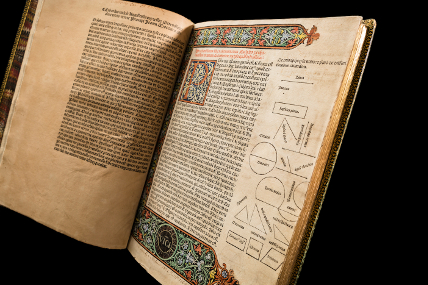The Department of the History of Science presently consists of 11 core faculty (including the Curator of the History of Science Collections), with additional collaborating scholars in the Honors College, the History Department and elsewhere. Graduate students study for both Masters and Ph.D. degrees. The Department of History of Science has the largest research group specializing in early modern science in North America, as well as special strengths in the history of technology and the history of medicine. The department's geographical scope includes Europe (especially Lutheran Germany and Victorian England), the United States in the nineteenth and twentieth centuries, South Asia (especially India and Indonesia) and later Islamicate science (especially Safavid Persia). The University of Oklahoma is the editorial site for the Isis Current Bibliography, the most important international bibliography of work in science studies and allied fields. For the last nine years, the journal Technology & Culture, the leading international journal in the history of technology, has been edited here as well. The Department also regularly hosts international visitors attracted by the History of Science Mellon Fellowship program.
Edition Open Sources (EOS) is a collaborative venture with the Max Planck Institute for the History of Science in Berlin that brings together the resources of both the History of Science Department and the Collections at OU. EOS is a peer-reviewed series devoted to publishing scholarly editions of primary sources. Publications appear in both digital and physical formats. The digital publications are free and accessible worldwide under a creative commons license. Contact the editors if you have a project you're interested in publishing through EOS. See the OU EOS web page for more information (http://www.ou.edu/cas/hsci/digital-projects/edition-open-sources).
Specialty
Research university; history of science collections with strengths in astronomy, physics, natural history, geology, technology, and science and religion
Collections
The History of Science Collections, founded in 1949 with an initial gift from Everette Lee DeGolyer, is a premier research collection. Its holdings include nearly 100,000 print volumes across diverse disciplinary subject areas, along with current publications in the field. The Collections supports multidisciplinary research in every chronological period, geographic region, and subject area of science, technology, and medicine. Among the oldest items are a cuneiform brick (ca. 1300 BCE), a small number of medieval and early modern manuscripts, and the Collections' oldest printed book: Hrabanus Maurus, Opus de universo (1467). Astronomy, physics, natural history, geology, technology, and science and religion are traditional areas of strength for the print holdings. Areas of recent concentration include women in science, Islamicate science, star maps, and science and technology in Asia. Holdings of the allied Western History Collections are of interest to scholars investigating the history of environmental science; science and Native American culture; or geology and natural history in the American West. Archives support research in the history of geology, meteorology, technology, and physics, among other topics. Digital collaborations include the Darwin Online project of Cambridge University; the Galileo//Thek@ digital library of the Museo Galileo in Florence, Italy; and Edition Open Sources with the Max Planck Institute for the History of Science in Berlin. A travel fellowship program, endowed by the Andrew W. Mellon Foundation, supports short-term use of the Collections by visiting scholars. The Collections works closely with the Department of the History of Science and with the Western History Collections.
Collections URL
Holding Highlights
- Over 100,000 volumes comprising the printed record of science from the 15th century to the present time
- early printed books from 15th through 17th centuries, including over 50 incunabula, many first or notable editions of ancient and medieval authors, and key texts reflecting developments in astronomy, cosmology, natural philosophy, medicine and natural history throughout the Renaissance and the period of the Scientific Revolution
- scientific journals from the 17th century through the 19th century, including the Philosophical Transactions of the Royal Society and the publications of many other smaller scientific societies
